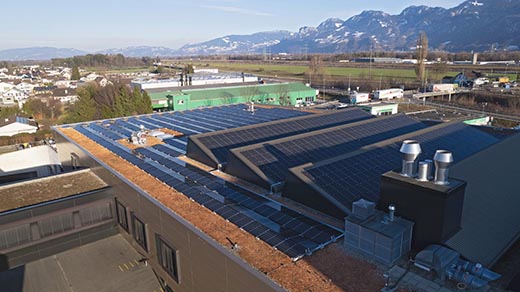swissQprint Moves Ahead with Solar Power
Press release from the issuing company

swissQprint solar installation © swissQprint
A photovoltaic installation has begun operation at swissQprint headquarters. It is set to cover more than 50 percent of electricity demand at the Schützenwiese building complex in Kriessern, where swissQprint is headquartered.
A solar array with 1276 photovoltaic panels in Kriessern, Switzerland, was connected to the electricity grid in February 2024. It is installed on the roof of swissQprint's main production hall and will produce around 613,000 kWh of electricity a year. This corresponds to more than half of electricity demand at the Schützenwiese business park, where swissQprint is one of the largest companies.
A step towards electricity self-sufficiency
The photovoltaic installation will also power eight newly erected charging stations for electric vehicles. It is designed for easy future expansibility. “The solar project brings us a big step forward in terms of sustainability and self-sufficiency,” says Reto Eicher, co-owner of swissQprint and the project coordinator.
A foundation built on sustainability
When the business park was built back in 2013/14, the construction clients including swissQprint put strong emphasis on sustainability. Building services are independent of fossil fuels. Interiors are heated and cooled by groundwater. Electric pumps drive the heat exchange system, which will be powered in future from the photovoltaic installation.
Swiss building standards are high by international comparison and the Schützenwiese business park exceeds the standard for industrial buildings. That includes the insulation R-value of the building envelope and windows, as well as automatic sun blinds. Optimised temperature management is the objective throughout.
The entire building complex uses energy-saving LED lighting. Furthermore, both swissQprint production halls have saw-tooth roofs that admit ample natural light into the building interior. This makes artificial lighting superfluous at times and further reduces electricity consumption.
- Questions to ask about inkjet for corrugated packaging
- Can Chinese OEMs challenge Western manufacturers?
- The #1 Question When Selling Inkjet
- Integrator perspective on Konica Minolta printheads
- Surfing the Waves of Inkjet
- Kyocera Nixka talks inkjet integration trends
- B2B Customer Tours
- Keeping Inkjet Tickled Pink
© 2024 WhatTheyThink. All Rights Reserved.















- Discussion is closed -